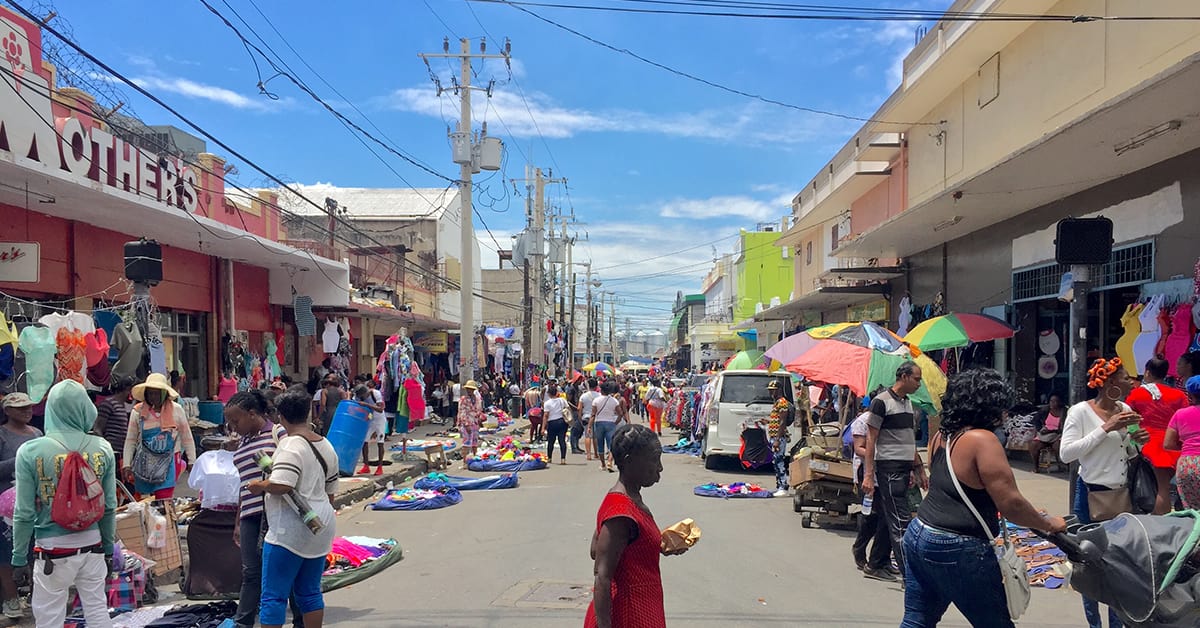Tides are turning in Jamaica with tourism rebounding after the shock of Covid-19.

|
VITAL STATISTICS |
|---|
|
Location: Caribbean |
|
Neighbors: Cayman Islands, Cuba, Haiti |
|
Capital city: Kingston |
|
Population (2022): 2,983,494 |
|
Official language: English |
|
GDP per capita (2020): $4,664.50 |
|
GDP growth (2021): 4.3% |
|
Inflation (2021): 11.3% |
|
Unemployment rate 2021 (est): 6.2% |
|
Currency: Jamaican dollar |
|
Investment promotion agency: Jamaica Promotions Corporation |
|
Investment incentives available: Special economic zones, capital allowance on industrial properties when submitting annual returns, duty-free importation of capital equipment and raw material for productive sectors, various tax abatements and discounts, concessionary interest rate loans for trade financing |
|
Corruption Perceptions Index rank (2021): 70 |
|
Political risk: Local elections have been repeatedly postponed; no definite date has been set at time of writing. No major political violence since the early 1980s. |
|
Security risk: Violent crime. Active transnational criminal organizations. Extortion in urban commercial areas and on large construction project sites. |
|
PROS |
|---|
|
English-speaking |
|
Close to the US |
|
Government prioritizing policies for a more inclusive economy |
|
Tourism recovering |
|
Robust stock market |
|
CONS |
|---|
|
Weather-related risks |
|
High inflation |
|
High poverty rate |
|
Vulnerable to price shocks, especially in energy |
|
Sources: Government of Canada Global Travel Advisory, Jamaica Promotions Corp., Statistical Institute of Jamaica, Trading Economics, Transparency International, UK Government Foreign Travel Advice, US State Department, World Bank, World Population Review |
|
For more information, check out Global Finance‘s Jamaica Economic Report data page. |
Jamaica seemed to have turned its fortunes around after two decades of being the slowest-growing economy in the Americas, with an ambitious debt-restructuring plan started in 2012. The Jamaican stock market and the country’s dollar have been on a bull run ever since. Aided by the International Monetary Fund, the country lowered its debt-to-GDP ratio from 137.9% in 2014 to 91.5% in 2021. According to Trading Economics, the Jamaican economy rose 13.9% from 2014 to 2019, exceeding its yearly average GDP growth of 0.33%.
But then came the pandemic, and the tourist-dependent Caribbean nation slumped back to square one, its GDP contracting by 10% in 2020 alone. Jamaica’s economy was less affected than some other Caribbean islands, but lingering travel restrictions remained a drag on growth, which rebounded to 4.3% in 2021, according to the World Bank.
Renaissance Expected
Minister of Tourism Edmund Bartlett predicts that 2022 will be a “true year of recovery.” Speaking at a celebration of Jamaica’s 60th anniversary of independence, he said, “We expect to close 2022 having welcomed a total of 3.2 million visitors contributing more than $3 billion to our economy.” If so, it will be nearly 50% more tourism revenue than the year before.
Kalilah Reynolds, a prominent Jamaican business journalist and CEO of Kalilah Reynolds Media, sees encouraging signs of growth but warns of macro risks such as inflation and supply chain disruptions. “Jamaica, like much of the rest of the world, is experiencing a period of high inflation,” Reynolds notes. “The country still heavily relies on imported inputs, such as fertilizer and oil, which have risen dramatically in recent months.”
The largest and most populous English-speaking island in the Caribbean, Jamaica currently enjoys an all-time low unemployment rate of 6.2%. The country’s many business advantages include 14 seaports and three international airports.
On the other hand, it currently has the highest murder rate in the Americas, according to insightcrime.org. It also faces significant weather-related risks. “Natural disasters have severely impacted Jamaica’s economic growth,” concludes a report from USAID.
Kingston’s political system is currently regarded as stable and democratic, even though general elections have been postponed twice since 2020, purportedly due to Covid. Jamaica has preferential trade agreements in force with the US, the EU and Canada, as well as having good business relations with China. It is a popular base for pharmaceutical companies—AstraZeneca and GlaxoSmithKline both have operations there, according to government reports. It has also attracted Scotiabank from Canada, Archer Daniels Midland from the US, and China’s Huawei.
“Language and location,” Reynolds says, “give Jamaica a competitive advantage over both its Latin American neighbors and English-speaking nations farther away.”



